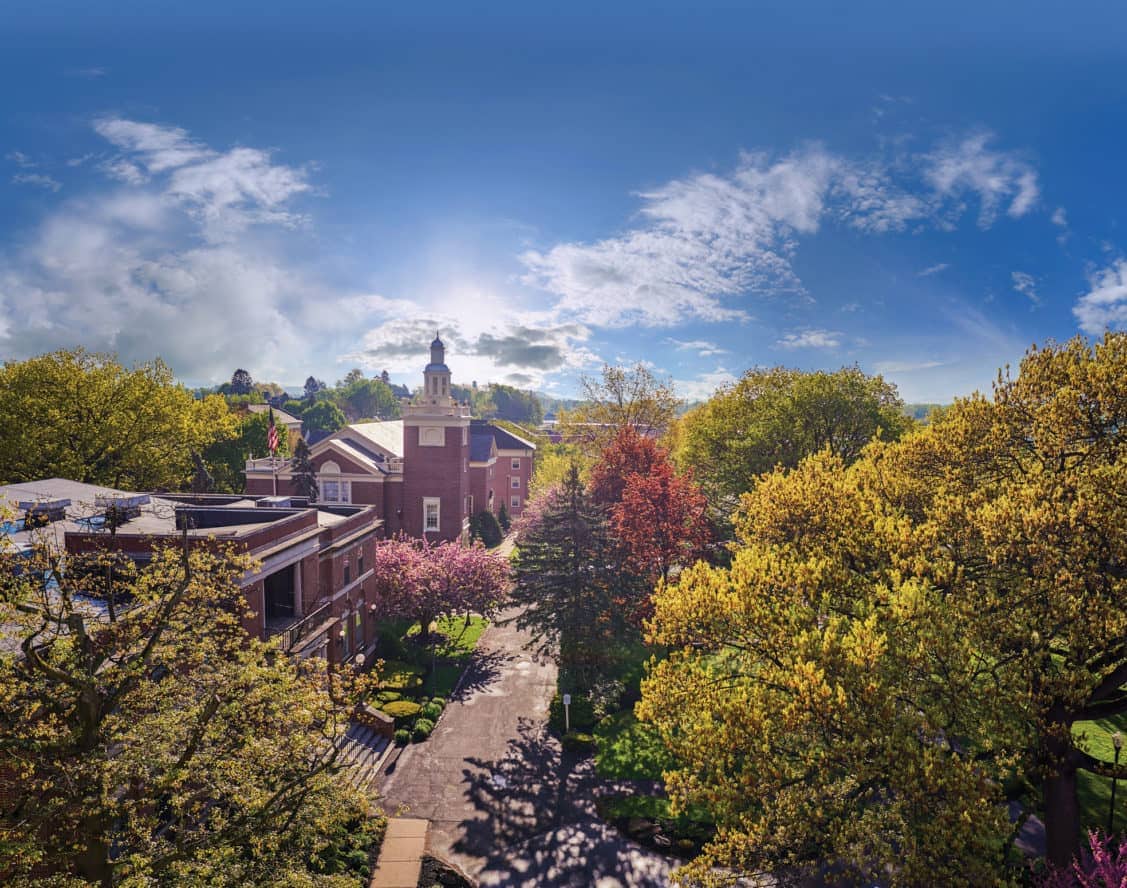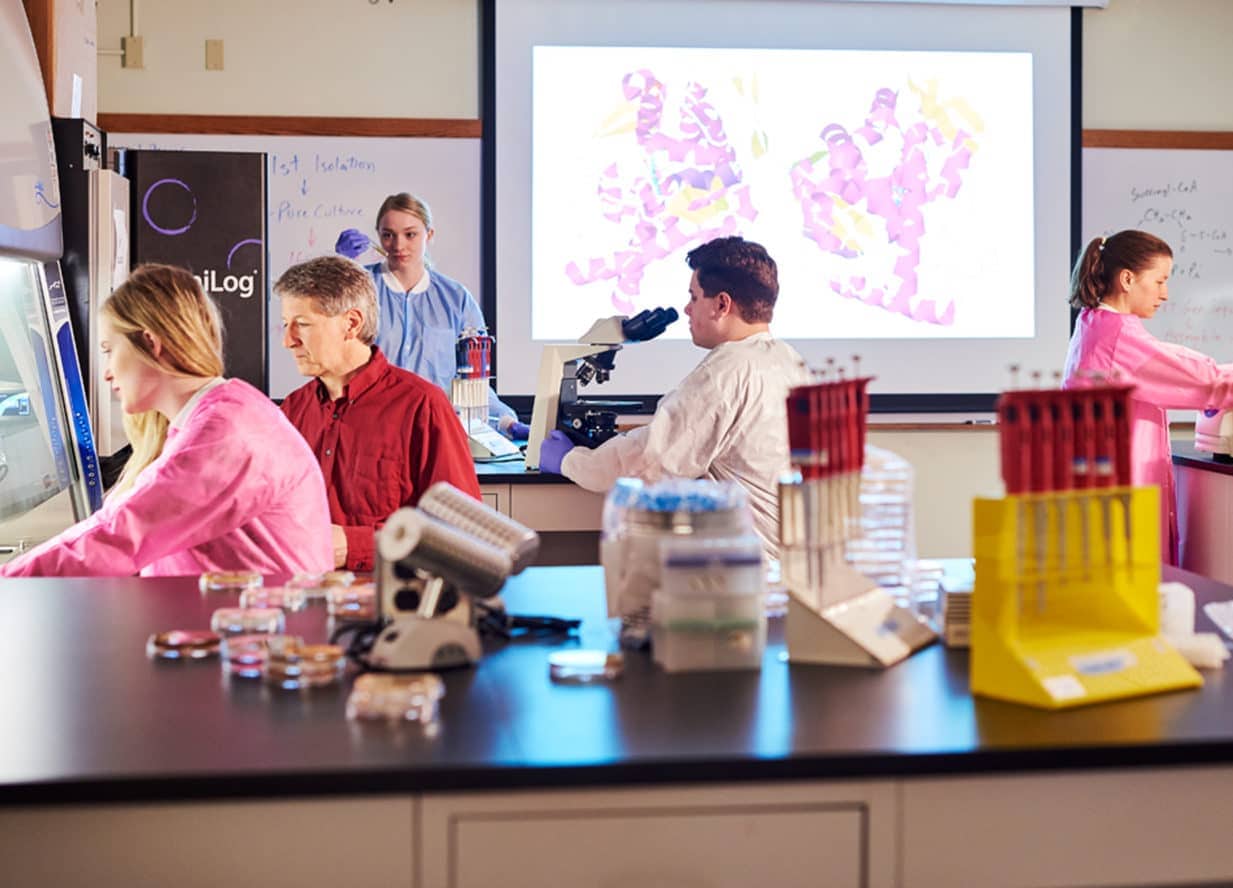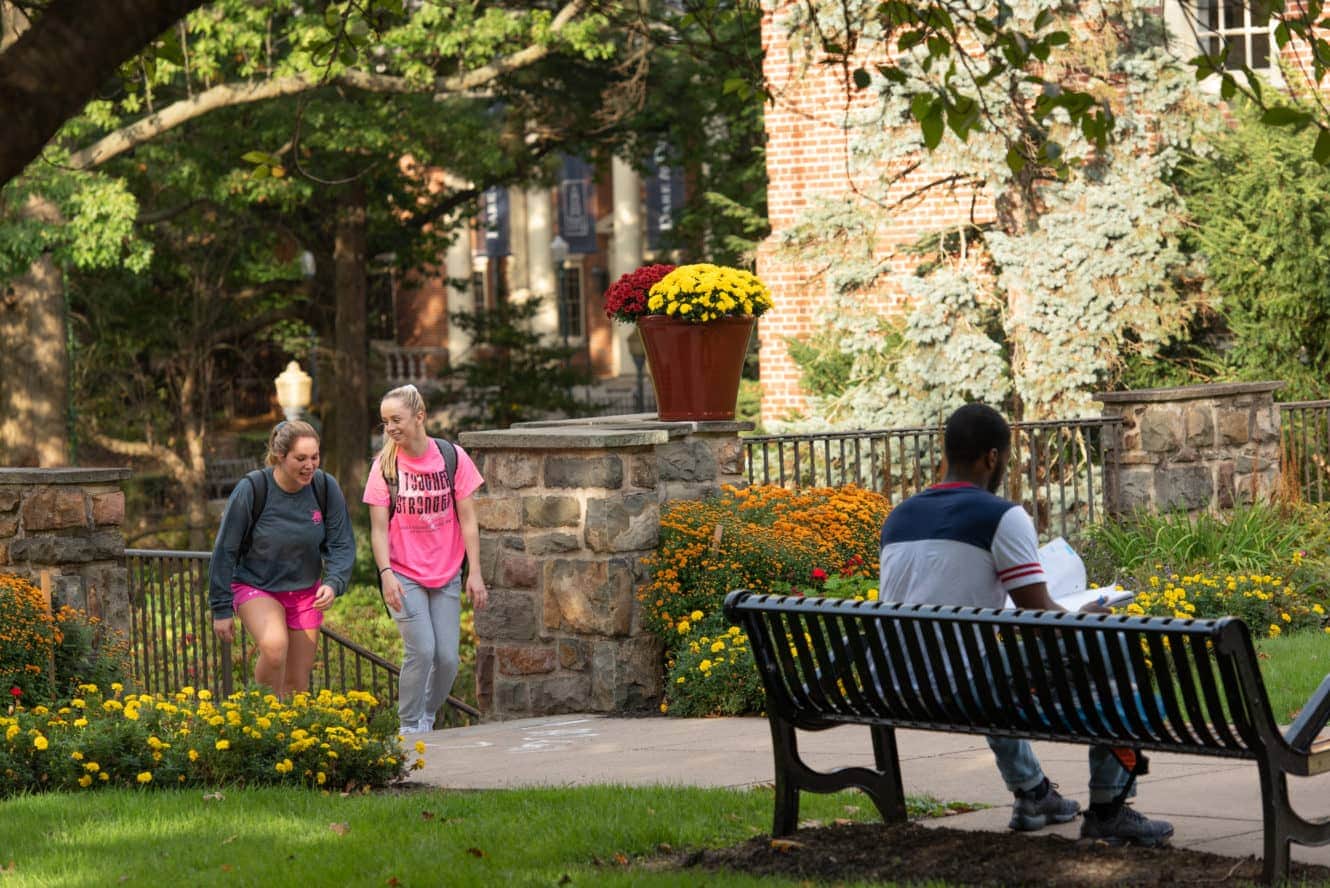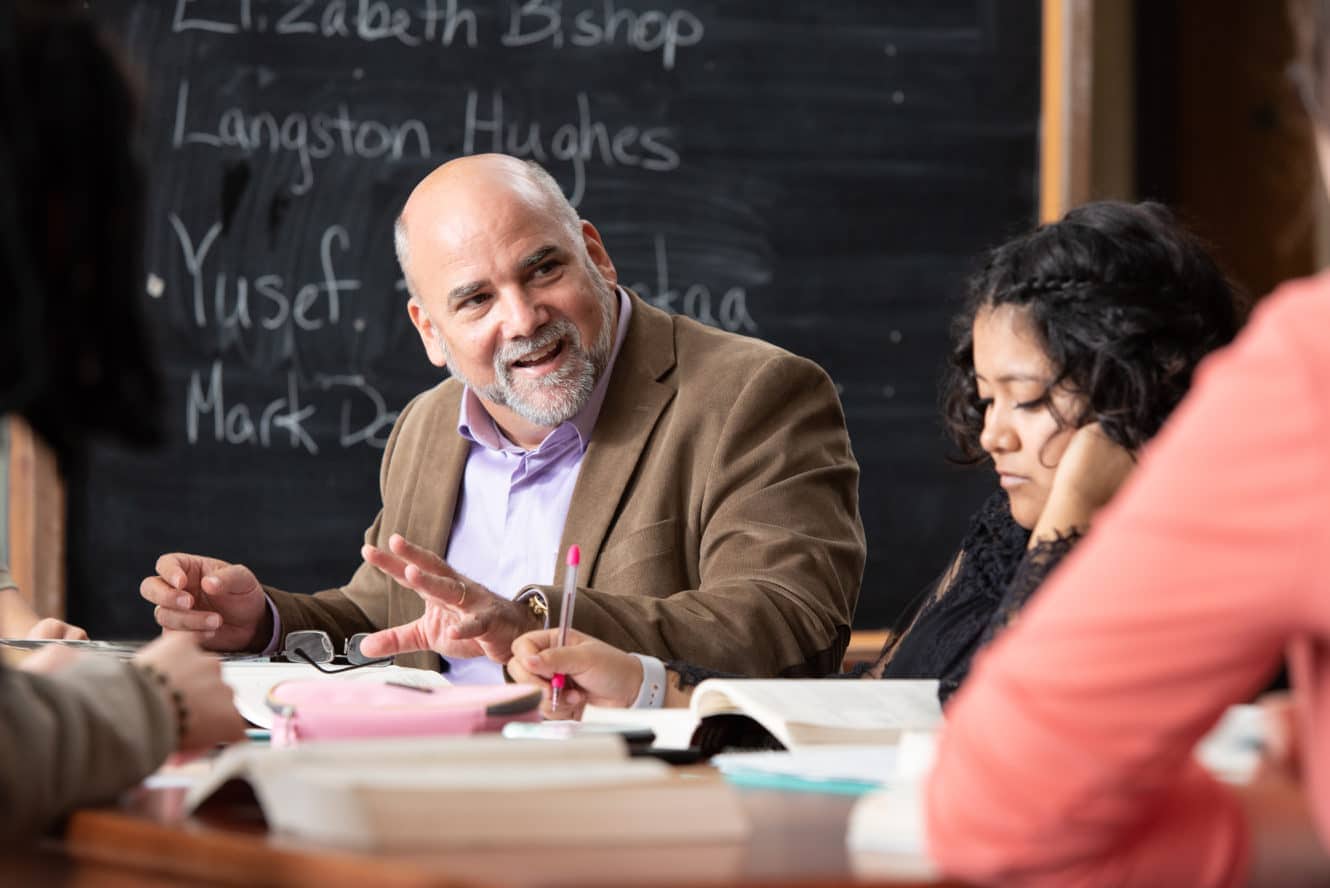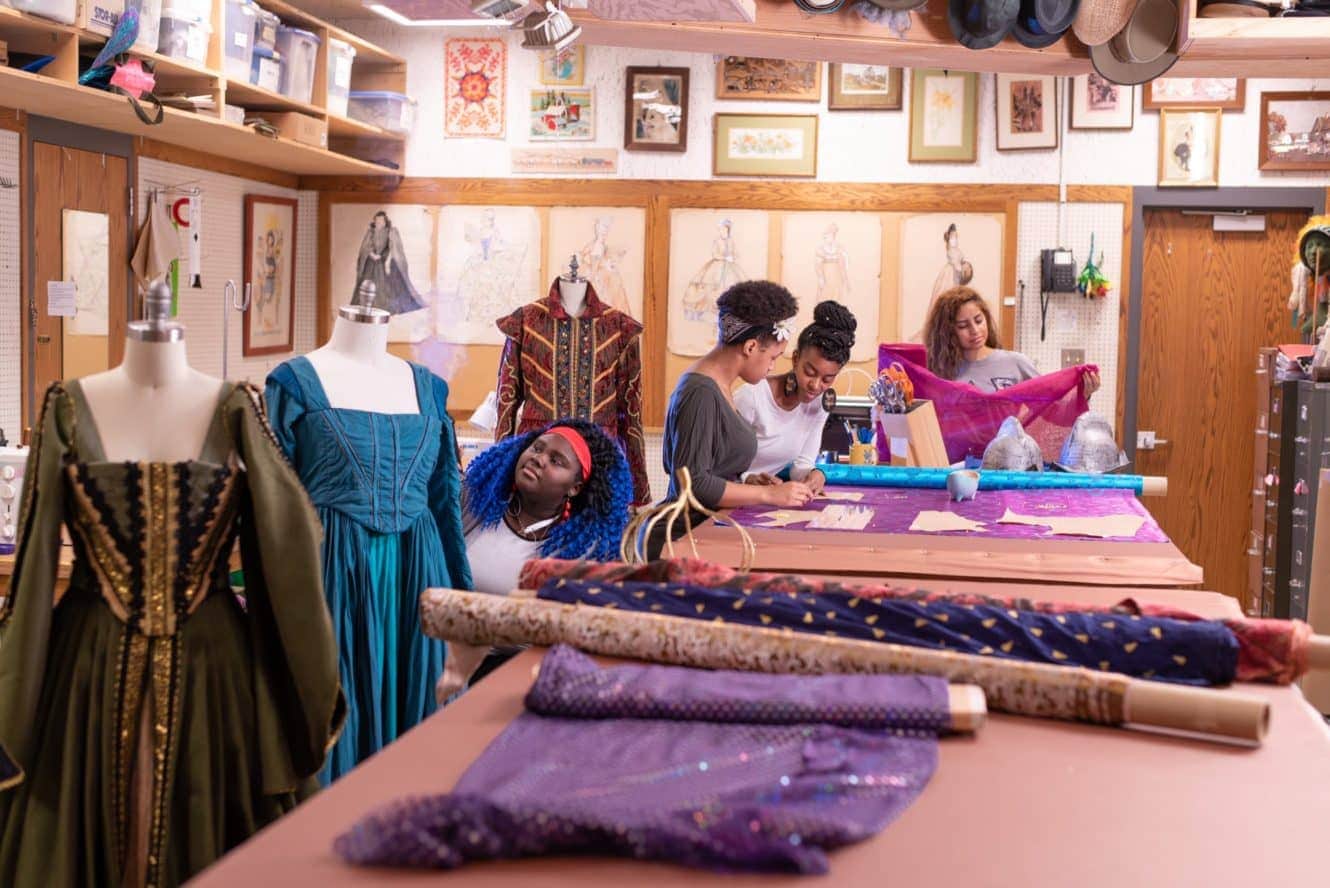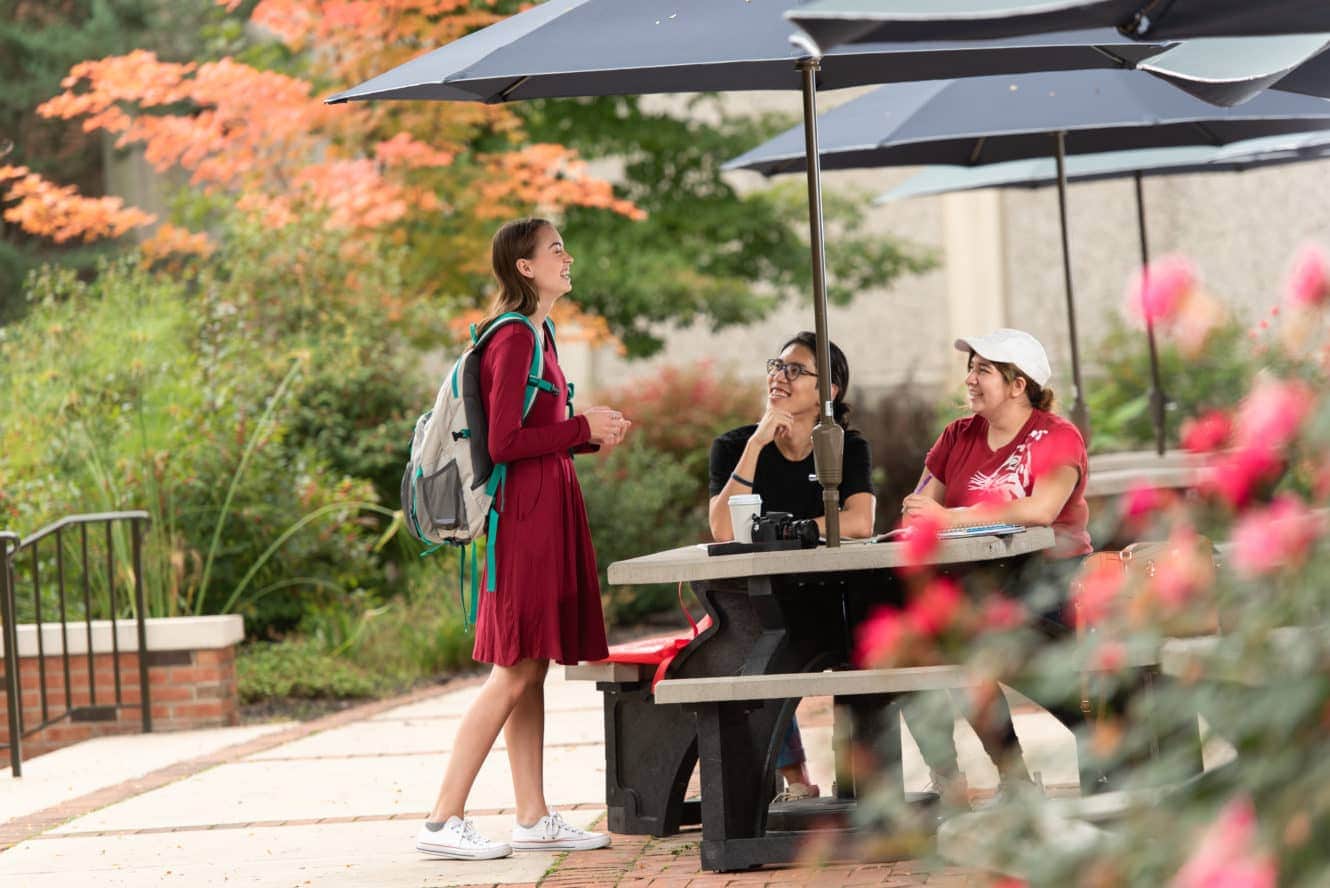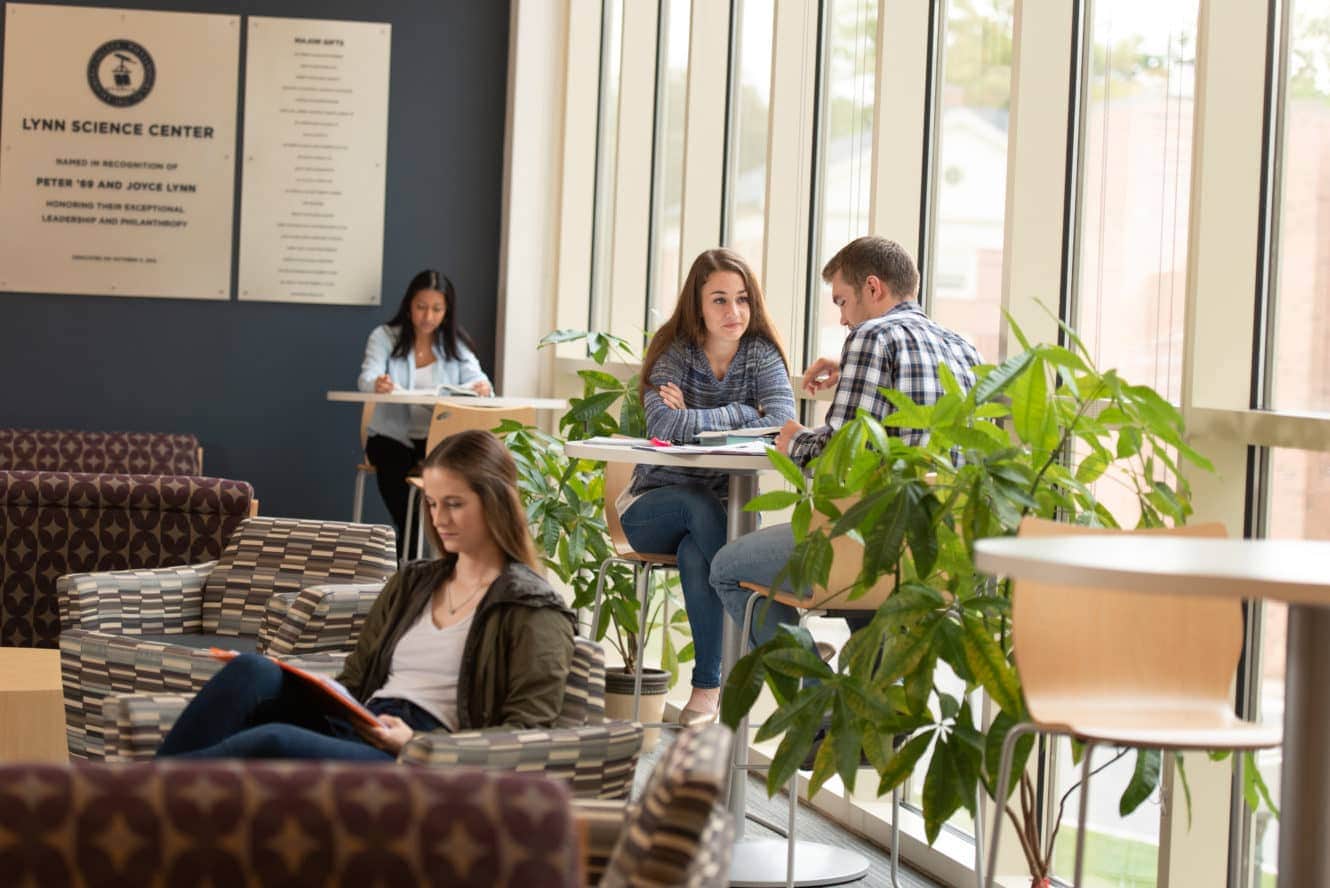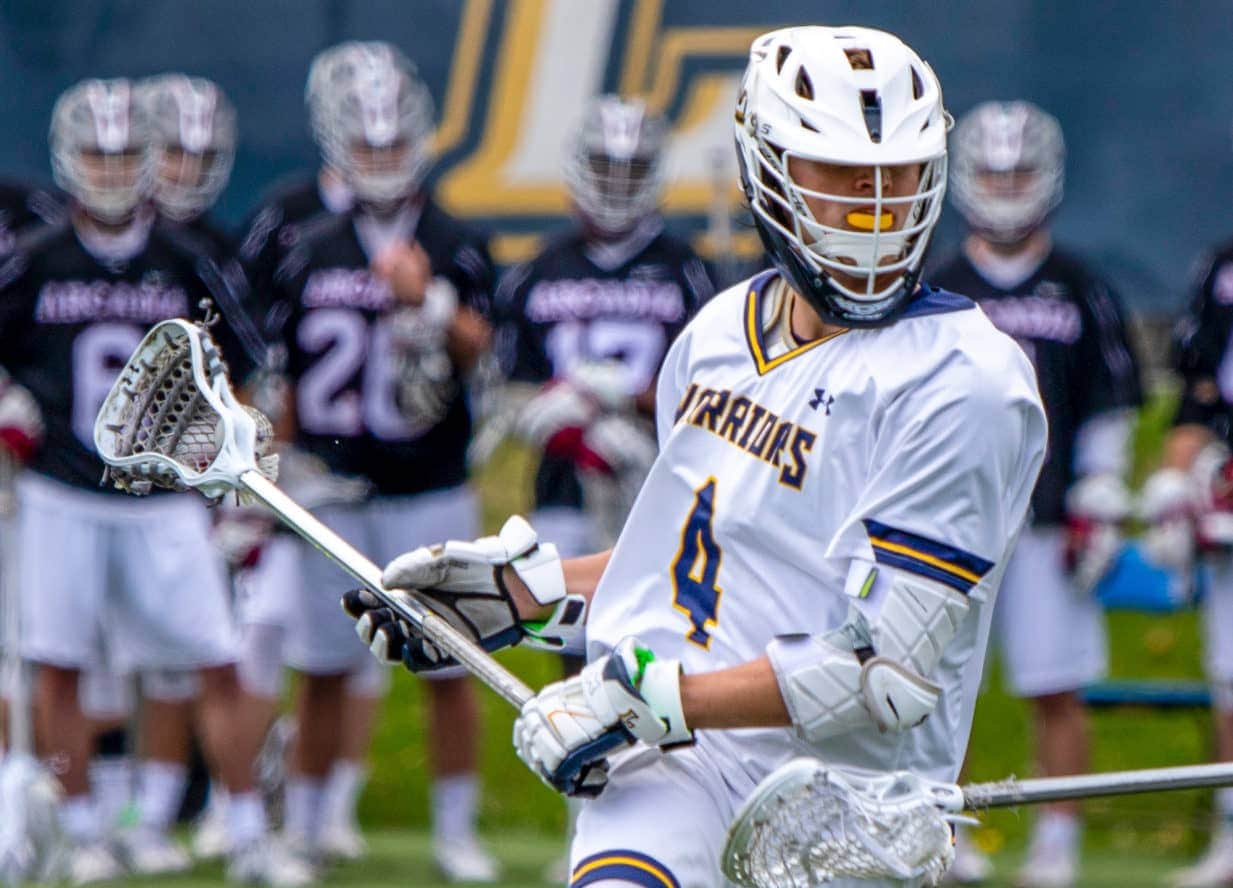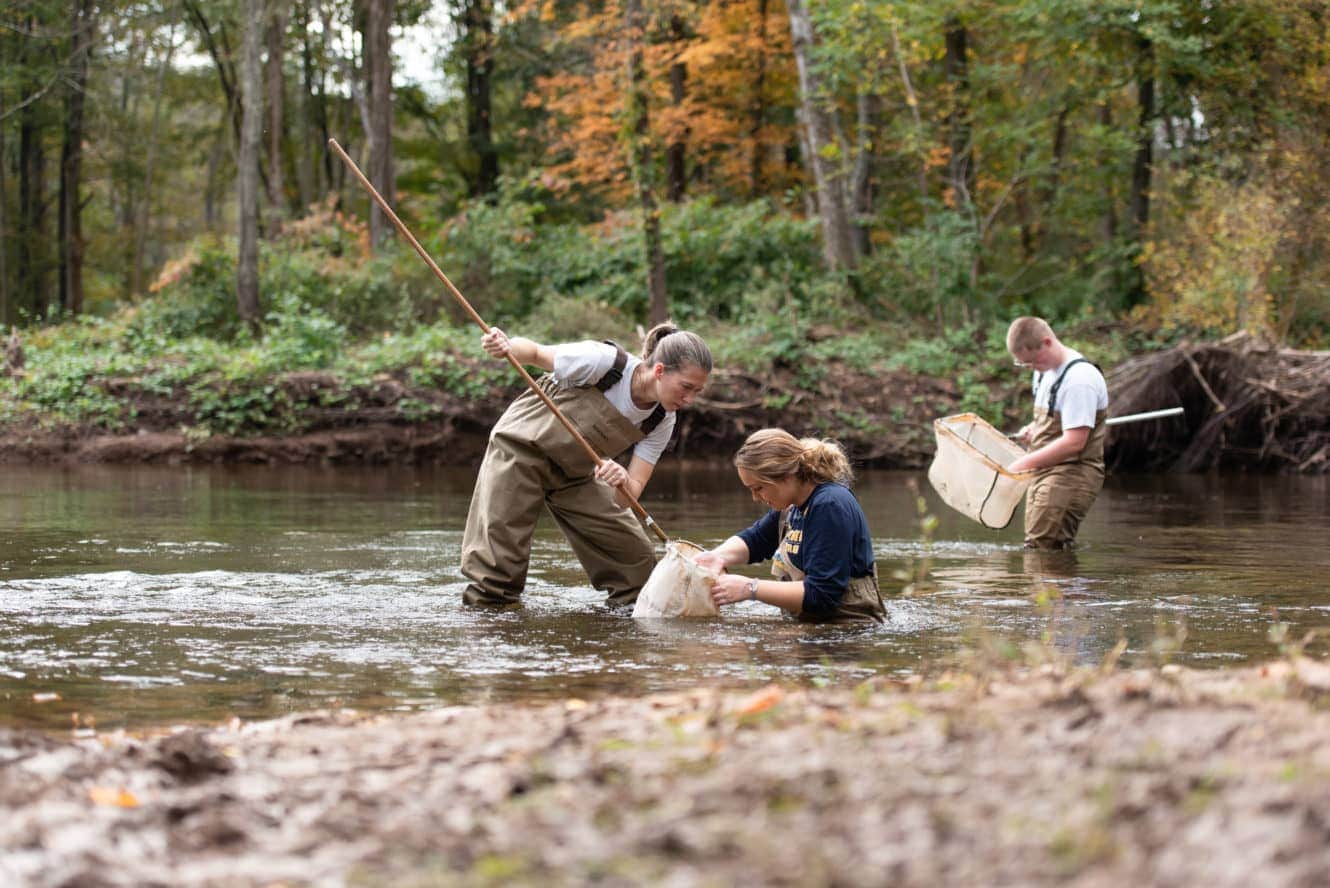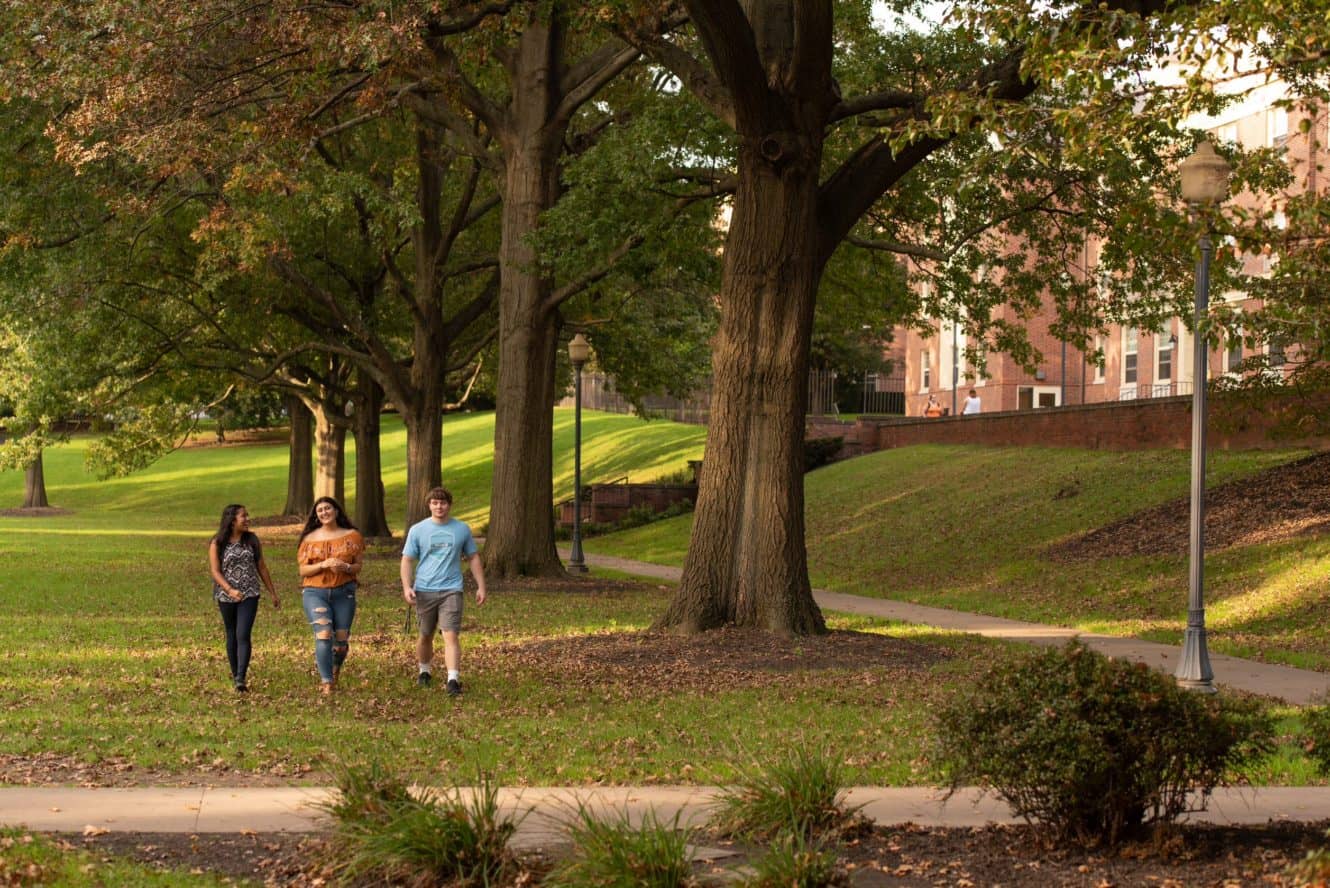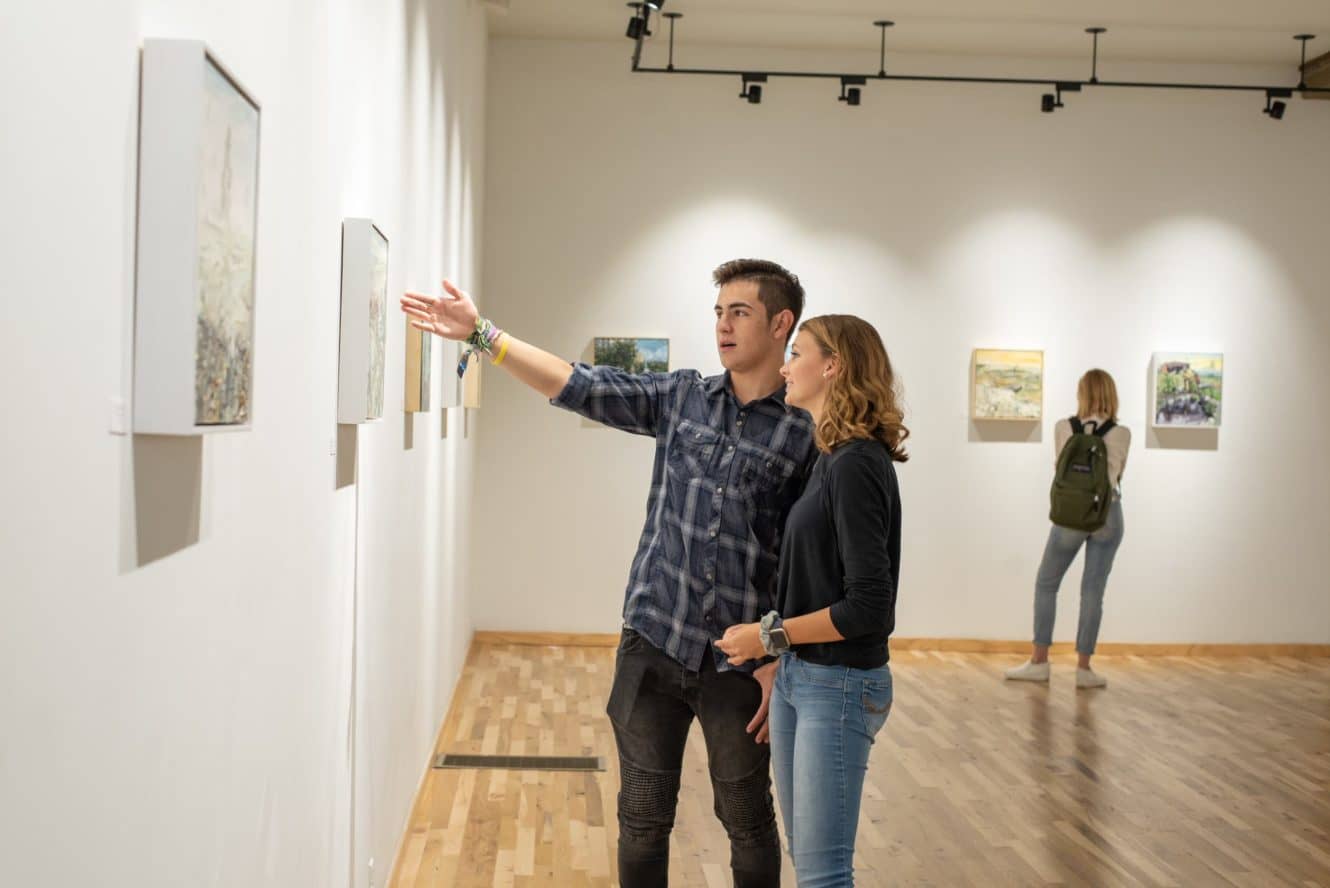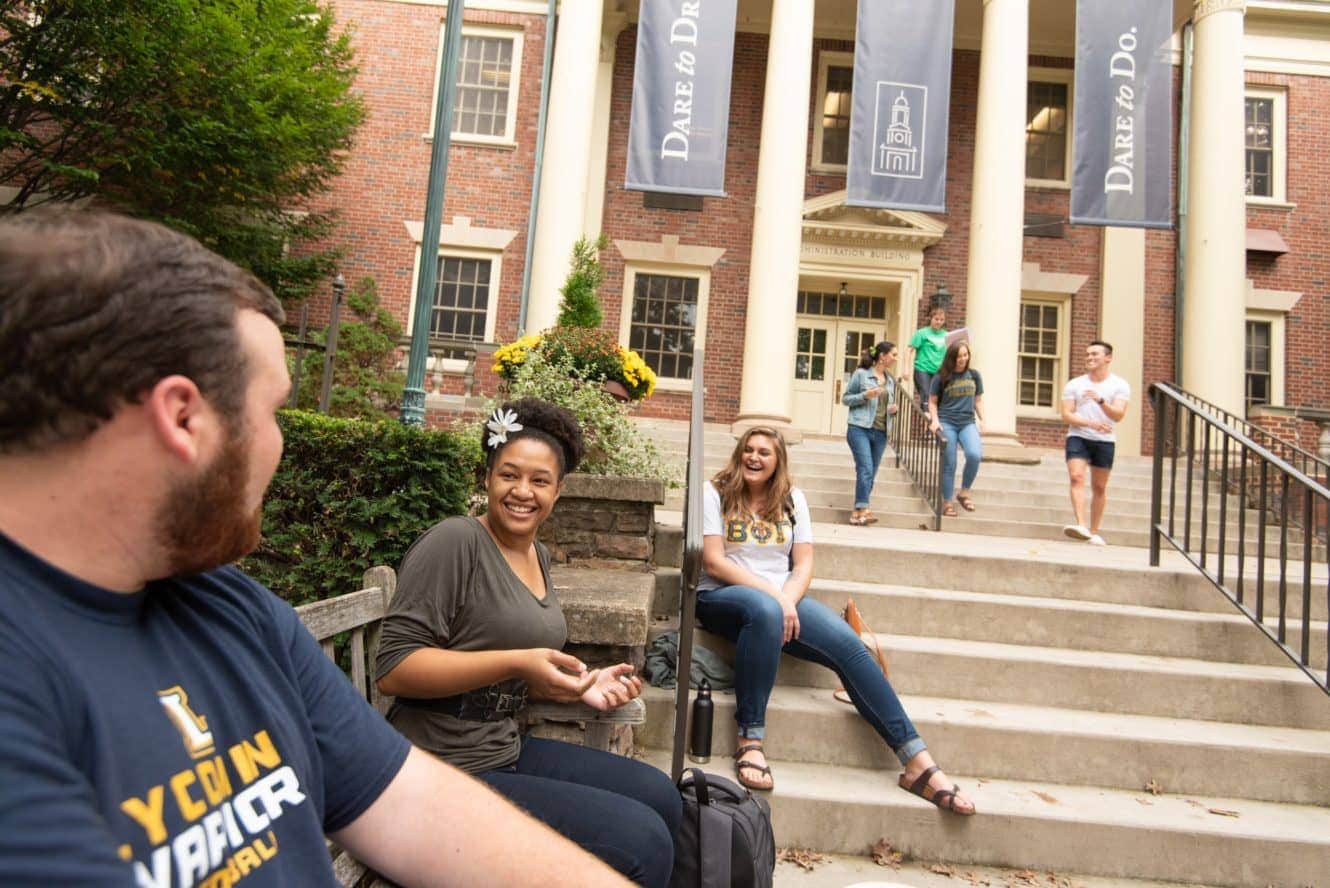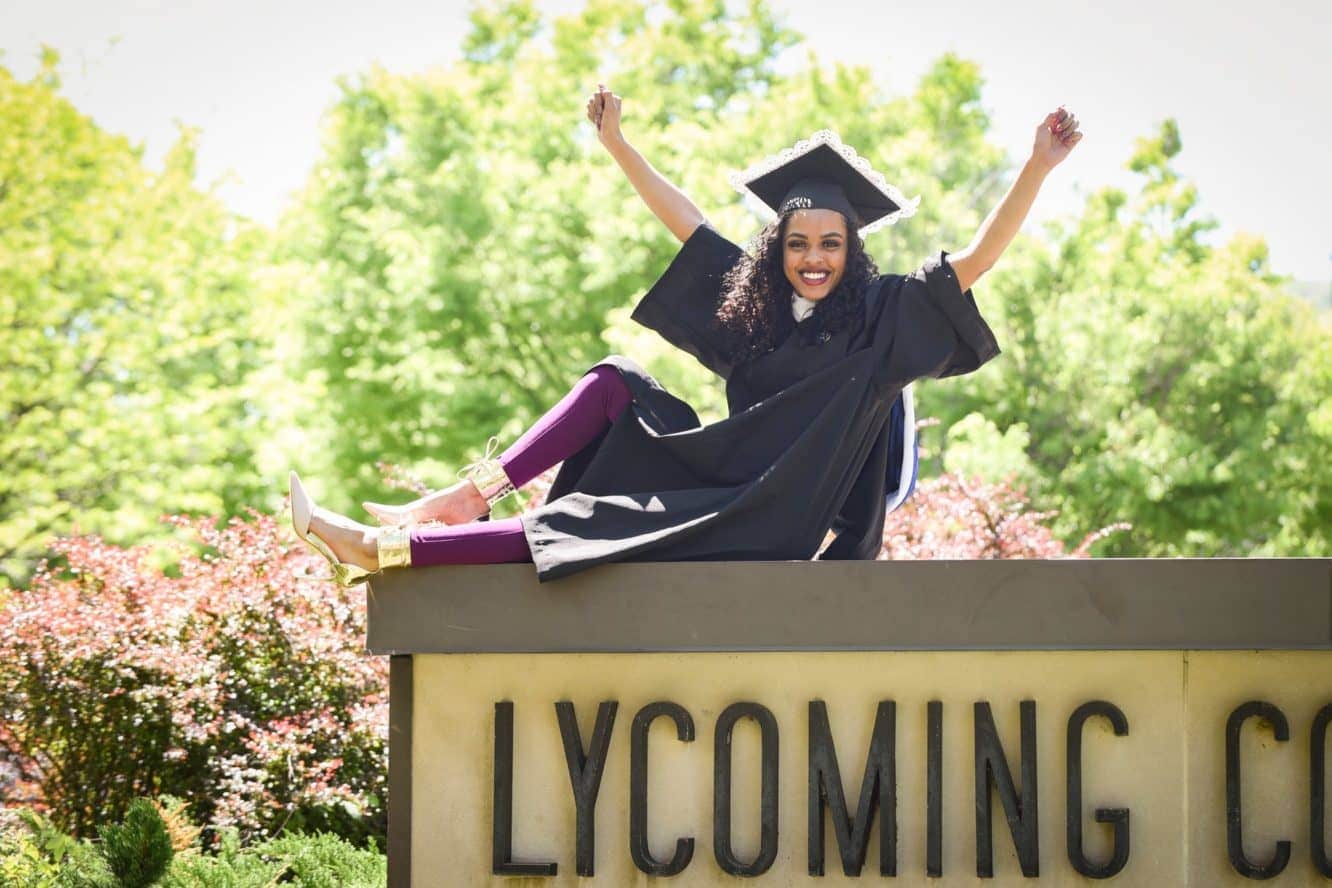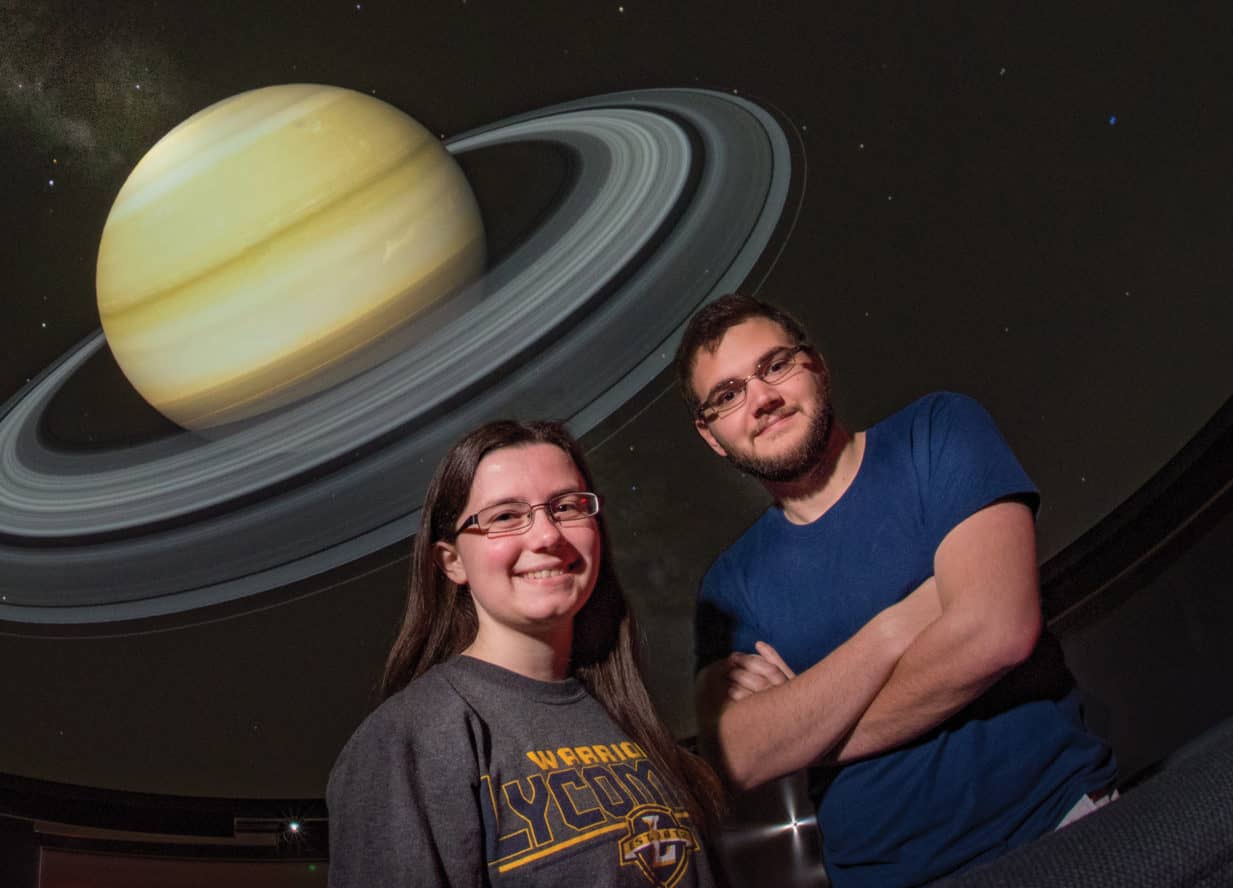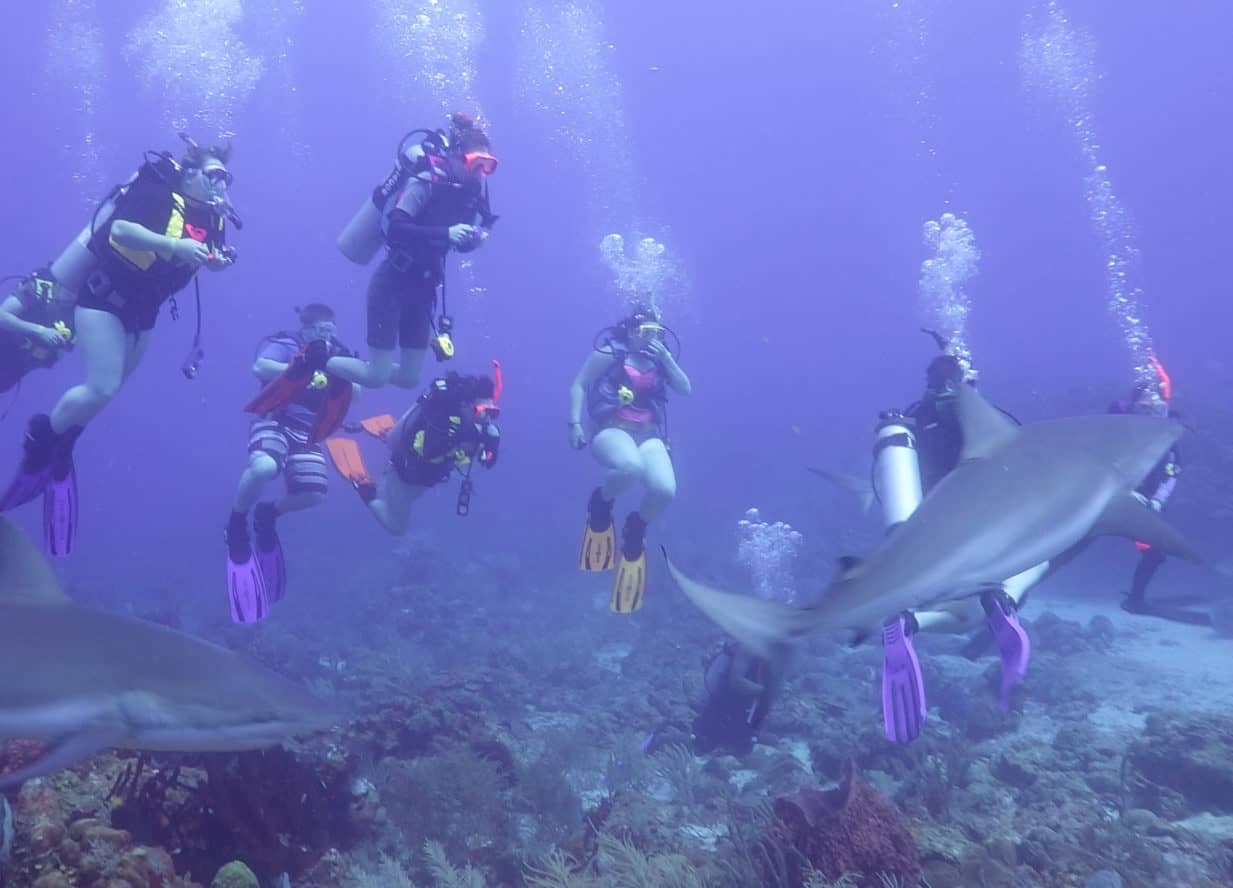Lycoming College
Williamsport, Pennsylvania
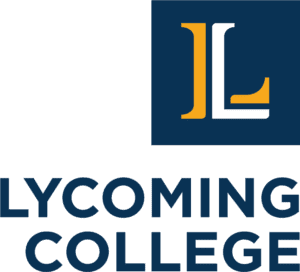
Lycoming College was last recognized as a College of Distinction in the 2024-2025 academic year.
Lycoming College is a private, residential, four-year liberal arts and sciences college in Williamsport, PA, that inspires students to think deeply and act boldly through an innovative, high-impact learning and high-reward career-advising approach. With a close-knit student population of approximately 1,200, Lycoming facilitates engaging classroom discussions and hands-on experiences, giving students the individual attention they need to pursue careers of significance and lives of meaning.
With an academic offering of more than 48 majors and 65 minors, Lycoming allows students to craft customized, cross-disciplinary degrees that match their passions and aspirations. Furthermore, a specialized Center for Enhanced Academic Experiences provides students with countless opportunities to apply knowledge outside the classroom in fieldwork, internships, global studies, or research alongside faculty. Since the College’s founding in 1812, its classic degree programs in business, social sciences, art, and education have held strong, but Lycoming also boasts an impressive natural sciences program. Laboratory-based instruction, cutting-edge instrumentation, and facilities such as the Lynn Science Center, Detwiler Planetarium, and the Lycoming Biology Field Station, as well as newly renovated laboratory spaces, allow students to explore theoretical subjects through real-life experiences. As an exclusively undergraduate college, the research opportunities offered from day one provide a unique advantage for students interested in pursuing a STEM career or graduate school.
Get to know Lycoming College
Benefits
High-Impact Practices
- First-Year Seminars and Experiences
- Writing-Intensive Courses
- Collaborative Assignments and Projects
- Undergraduate Research
- Diversity/Global Learning
- Service-Learning, Community-Based Learning
- Internships/Coops/Practica
- Capstone Courses and Projects/Senior Experience
Campus Resources
- Career Services
- Writing Center
- Academic Advisors
- Library Services
- Faculty Mentors
- Disability Services
- Multicultural Engagement Center
- Health Services
College Highlights
UNDERGRADUATE RESEARCH
Lycoming students have countless opportunities to conduct undergraduate research, many of which are embedded right into the curriculum. As a college dedicated exclusively to undergraduate education, students have access to advanced research equipment early on—some of which is comparable to technologies found at major research centers. Between individual research conducted for methods courses and research conducted alongside faculty, students are constantly applying their knowledge in hands-on experiences. An internship program with Lycoming’s Clean Water Institute, the Williamsport Internship Summer Experience, and our chemistry and biochemistry Endowed Summer Research Fellow program are just a few of the ways Lycoming has expanded the scope of research opportunities outside the classroom. Through its well-established career mentor approach, Lycoming students have also found a high-rate of success getting into nationally recognized summer research programs, such as the National Science Foundation’s Research Experience for Undergraduates (REU). Additionally, by presenting research at regional and national conferences and co-authoring manuscripts with faculty for publication, Lycoming graduates are primed for competitive placement in the workforce or at top-tier graduate schools.
At Lycoming, research is not restricted to the sciences. Lycoming recently established the Humanities Research Center (HRC) to support and enhance educational opportunities for students majoring or minoring in English, History, Philosophy, Religion, and Modern Language Studies, through collaborative student-faculty research, as well as internships and study abroad. The HRC offers opportunities for students in the digital humanities through a history podcast, and with a regional humanities research conference and related student-edited research journal.
“Lycoming and my faculty have been instrumental in helping me pinpoint my passion. The small class sizes have allowed me to receive individualized attention, and the faculty go out of their way to help me understand complex subjects. The opportunity to perform undergraduate research with faculty in the biology and chemistry departments has been integral in finding my current path.” – Carter Branigan ’24, Cell and Molecular Biology major
DIVERSITY IN THE STUDENT BODY
Lycoming College is ascending into a truly national college in terms of diversity of the student body. Approximately 36% of the most recent freshman class (Class of 2027) was comprised of out-of-state students, including 25 states and territories, and 16 countries, including France, Vietnam, Costa Rica, Ethiopia Mauritius, and Uganda. The membership of the Class of 2027 also suggests that Lycoming is successfully adapting to the dramatic change in the ethnic composition of the college-going population in the United States with 30% of the class representing the global majority or international. These numbers position the college well to compete for talented students from the fastest-growing segment of the college-going population in America.
DIVERSITY IN THE CURRICULUM
The College’s cultural diversity curriculum requirement reinforces its celebration of human difference, which is inherently emphasized within the liberal arts. These designated diversity courses provide students with both historical and contemporary cultural perspectives outside of the predominant Anglo-American one in the United States. Students are required to choose a global diversity course and domestic diversity course—global diversity courses aim to help students understand the world beyond the United States borders, while domestic diversity courses concentrate on one or more minority groups within the United States, exploring such issues as race, gender, social class, religion, political ideology, sexual orientation, or any combination thereof.
GLOBAL LEARNING
Students at Lycoming are encouraged to take part in a study abroad experience during their undergraduate career. Various opportunities like May Term and summer sessions with faculty, as well as entire semesters or academic years overseas, allow students to immerse themselves in long- and short-term global adventures and expand their worldviews. Students have spent time abroad in a wide variety of locations, including England, Spain, France, Iceland, Italy, Germany, China, Mexico, the Dominican Republic, and more.
“Traveling to Italy and Greece allowed me to see another way of life different than what I have grown up with. Learning to travel and interact with local people while being surrounded by my friends, peers and professors made my first trip out of the country a once in a lifetime experience.” – Jacob Wagers ’26, Biology major
WARRIOR COFFEE
The Warrior Coffee Program is a truly unique interdisciplinary and global experience, funded in part by every delicious cup of coffee served on campus and beyond. Warrior Coffee comes from the remote mountains of the Dominican Republic, grown under a natural shade canopy and hand-picked by multigenerational coffee farming families. The program starts in the classroom with a course called “Globalization in the Developing World.” Through class, research, and a trip to the Dominican Republic, Lycoming students learn how creative and mutually beneficial partnerships can produce excellent coffee, all while advancing responsible agricultural practices and providing family-sustaining incomes for the remote farmers of El Naranjito and Peralta. In addition to helping farmers in their efforts to improve coffee quality in yields, students and professors in political science, chemistry, and education also work with community members to improve their quality of life in the areas of public health, water access and quality, and teaching methodology. The sales of Warrior Coffee altogether fund quality-of-life projects for these regions while subsidizing the cost of travel for Lycoming students.
“My experience with the Warrior Coffee Project completely changed my outlook on not only how I live every day, but also how I want to live every day. It made me realize my privilege in simple things like water but also how there’s a distinct lack of community that I would like to create moving forward.” – Makenzie Haxton ’27, Political Science major
CLASS SIZE
The number of sections of each class size.
2-9: 109 | 10-19: 120 | 20-29: 68
30-39: 14 | 40-49: 2 | 50-99: 0 | 100+: 0
ENROLLMENT BY ETHNICITY
Non-U.S. Citizen: 3%
Hispanic/Latine: 12%
Black or African American, non-Hispanic: 11%
White, non-Hispanic: 64%
Native/Indigenous American or Alaska Native, non-Hispanic: 0%
Asian, non-Hispanic: 2%
Native Hawaiian or other Pacific Islander, non-Hispanic: 0%
Two or more races, non-Hispanic: 3%
Race and/or ethnicity unknown: 5%
Lycoming prides itself on a culture of faculty mentorship. With a student-to-faculty ratio of 11:1, individuals receive highly personalized attention and have opportunities to work one-on-one with professors on research, manuscripts, and community initiatives. All classes are taught by expert faculty, 96% of whom hold a Ph.D. or the highest degree in their field, and many of whom are published scholars. All faculty members are also engaged in active research, writing, or fieldwork, while still making undergraduate success their top priority.
“Our students are designing experiments, presenting posters, and writing research-style manuscripts and grant proposals. When I go to a national meeting with students, my colleagues often come by saying ‘I can’t believe you’re doing this with undergraduates.’” – Dr. Mary Morrison, Associate Professor of Biology, Neuroscience Program Co-coordinator
FIRST-YEAR SEMINARS
To facilitate a successful transition to the College’s academic program while encouraging deep thinking, Lycoming hosts a diverse range of first-year seminar programs. These creative courses often focus on critical thinking, writing, oral presentation, and informational literacy. They also give students the opportunity to explore a topic that is completely new to them. For example, some courses have provided unique opportunities for science majors to explore civil rights, criminal justice majors to explore the biology of nutrition, history majors to discover the mathematics behind games and gambling, and art majors to study how groundbreaking technologies impact social relationships. They allow every first-year student to expand their breadth of knowledge and discover new interests. All first-year seminars meet a general education requirement, so each one advances the student toward graduation.
“Some of my favorite parts of the First Year Seminar Biology of Monsters are when we are talking about real life organisms and comparing them to monsters. It’s so much fun to talk about the many different reasons why monsters aren’t biologically possible. I’m really excited to have real life applications to share with future students. I find the fact that scientists look at certain organism locomotion to create better robots and prosthetics fascinating.” – Angelina Macchia Barba ’27, Biology major, Chemistry minor
ENHANCED ACADEMIC EXPERIENCE
To promote intellectual, professional, and personal development for life after Lycoming, each student is required to complete an Enhanced Academic Experience (EAE). This can be satisfied through the completion of a variety of projects, such as a departmental honors project, an internship, global study, faculty-sponsored collaborative research, a conference presentation, a publication, and more. Many individual categories of EAEs are able to overlap with distribution, major, or minor requirements.
“The most rewarding part of the Rural Alaska Teaching Program was being able to be a part of the community. When I go for walks I always run into my students or children in the village who want to talk to me and get to know who I am.” – Madisyn Neal ’24, a Biology major with a grade 7-12 teaching certification.
WRITING-INTENSIVE COURSES
A foundation in proper writing skills lies at the core of Lycoming’s liberal arts tradition. No matter their major, all students are required to participate in writing-intensive courses designed to support intellectual growth and the ability to communicate effectively. In these courses, students are encouraged to write in a variety of contexts and styles and are supported by both faculty as well as tutors in Lycoming’s Writing Center. All writing-intensive classes include formal writing instruction in the classroom, student writing, instructor feedback, and student revision.
LYCOMING BIOLOGY FIELD STATION
The College recently established a biology field station on 110 acres of land just 15 minutes from campus. Set alongside the Loyalsock Creek, the space provides a living laboratory for students studying aquatic biology, ecology, plant science, vertebrate and invertebrate zoology, and environmental biology. It is particularly ideal for students and faculty setting up long-term field projects related to their independent research and practicum projects. The College’s Clean Water Institute also utilizes the space to conduct water quality testing and assess wetlands. The field station has also been used as an archaeological field school, as the property was home to a historic, 19th-century farmstead.
SPECIAL STUDY OPTIONS
Programs available at this institution.
Accelerated program
Cooperative education program
Cross-registration
Double major
Dual enrollment
Exchange student program (domestic)
Honors Program
Independent study
Internships
Student-designed major
Study abroad
Teacher certification program
Undergraduate research
Weekend college
AFFINITY LEARNING COMMUNITIES
Lycoming College’s innovative Affinity Housing Community program enables students to develop and maintain a community that integrates the values of liberal learning into the residential environment, all while making valuable connections in a welcoming campus community. Affinity Housing Communities consist of 15-17 residents who organize around a shared intellectual or thematic interest, developing their own practices and traditions as they offer ideas for outreach consistent with their mission. These self-governed communities feature co-ed clusters of gender-specific single and double rooms with gender-neutral bathrooms.
STUDENT ORGANIZATIONS
The tight-knit Lycoming community is strengthened significantly through student involvement. With more than 60 campus organizations, including chartered clubs and intercollegiate or intramural sports teams, Lycoming’s wide selection of extracurricular activities encourage involvement no matter a student’s interests. Whether as a sports team captain, the president of an organization, or even just a member of a club, every student has the opportunity to make their mark on campus and develop as a leader. Students contribute to campus life through service organizations, student government bodies, academic clubs, sports, special interest clubs, and religious clubs.
OUTDOOR LEADERSHIP AND EDUCATION
In an effort to encourage students to pursue more experiential learning, Lycoming College recently created the Outdoor Leadership and Education (OLE) program. Through May Term courses spent hiking in the Grand Canyon, spring break trips, hiking, skiing, cycling and kayaking trips, OLE provides countless opportunities for students to learn hands-on leadership techniques that can be transferred into real-world experiences. The Outdoor Leadership and Education program has cultivated a growing student interest and offers opportunities for students to explore the Pennsylvania Wilds and “learn without boundaries.”
CIVIC ENGAGEMENT & PERSONAL DEVELOPMENT
Lycoming seeks to provide the foundation for students to expand their worldview, become engaged citizens, and lead the next generation. Its Office of Civic Engagement & Personal Development works with both the campus community and the greater Williamsport community to develop meaningful service opportunities while also enhancing a student’s academic experiences. The department has also developed a First-Year Summer Service Experience, which allows incoming freshmen to stay on campus and spend a week prior to the fall semester participating in service-learning opportunities, all while bonding with future classmates and building leadership skills.
VISITING SPEAKERS
A strong alumni support network and endowment allows many departments at Lycoming College to invite accomplished writers, scholars, artists, and business executives to speak or hold workshops for students on an annual basis. Recent speakers have included: Pulitzer Prize-winning author Michael Cunningham; 1981 Nobel Prize winner Dr. Roald Hoffmann; Global Chief Marketing Officer of SAP Alicia Tillman ’97; Academy Award-winner Tom Woodruff Jr. ’80, and Pulitzer prize-winning poet Rita Dove.
SCHOOL LOCATION
Lycoming College is nestled in the heart of Pennsylvania’s Susquehanna River Valley, an up-and-coming area filled with cultural, artistic, and outdoor excitement year round. Williamsport is thriving with local businesses and restaurants and a wide variety of shopping—all just steps away from the College campus. Perhaps best known as the birthplace of Little League Baseball, Williamsport offers something for everyone. The college also offers complimentary bus trips to nearby cities such as Washington D.C., Baltimore, New York City, and Philadelphia, allowing students the opportunity to explore bustling metropolitan areas with no fixed agenda.
ATHLETICS
At Lycoming College, almost one-third of the student body participates in one of the 19 varsity sports teams, which compete in the NCAA Division III Landmark Conference. Since 2014, the football, men’s basketball, men’s soccer, and wrestling programs have all been ranked nationally. The athletic department boasts a notable history that includes two national championship appearances, 43 conference championships, 25 Academic All-Americans, and 208 All-Americans. Lycoming College athletic teams are known as the Warriors, proudly wearing their school colors of navy blue and gold.
“I’m grateful for the Lycoming College small school experience because it’s allowed me to play lacrosse while still pursuing other co-curricular activities, all while maintaining a high grade point average. None of this would have been possible at a larger school.” – Zoe Stauffer ’24 Math and Actuarial Science double major
RESIDENCE LIFE
Percent of students living on campus.
First-time, first-year (freshman) students: 86%
Undergraduates: 83%
Campus housing options.
Coed dorms
Women’s dorms
Apartments for single students
Living-learning communities
Special housing for students with disabilities
Fraternity/sorority housing
Theme housing
Wellness housing
CENTER FOR ENHANCED ACADEMIC EXPERIENCES
Lycoming places experiential learning at the core of the institution’s academic identity. The Center for Enhanced Academic Experiences (CEAE) was specifically created to oversee career advising and internships, student-faculty research, and international education. Our unique career advising model matches each student with a career counselor based on their major. These counselors illuminate internship opportunities provided by Lycoming, help students perfect their résumés, and introduce students to external internship opportunities that will help them achieve their career goals. Through a variety of professional development workshops, students have the opportunity to hone in on and sharpen their skills in interviewing, professional etiquette, résumé writing, and much more.
The center also serves as the institutional hub for supporting faculty endeavors and for developing and sustaining enhanced educational opportunities. Some may also cultivate additional avenues, such as fellowships, while others simply allow a student an in-depth look at a new area of interest. All of this occurs before it is time to graduate and enter the workforce or pursue graduate studies.
“My time in the Dominican Republic helped me learn about the culture and people unlike any book could ever do. The days spent with my student group helped further my teamwork skills and gave me memories to last a lifetime.” – Luke Leach ’24, Chemistry major
INTERNSHIPS/PRACTICA
With the assistance of a dedicated group of career counselors, Lycoming students are well equipped for a variety of competitive internships, many of which are provided by Lycoming. Students intern with local organizations through Lycoming’s Williamsport Internship Summer Experience program as well as the Clean Water Institute, Paradigm Management Companies, the Cleveland Museum of Natural History, and many other renowned businesses and organizations throughout the country. Through these opportunities, students put theory into practice, develop professional skills, and even gain course credit for experiential learning.
“The Clean Water Institute has allowed me to develop both my scientific and professional experience through a variety of lab and field work. Thanks to the CWI I’ve been able to explore my academic interests further and better prepare myself for graduate school.” – Benjamin Fry ’25, Biology major, Chemistry and Environmental Science minor
CAPSTONE COURSES & PROJECTS
Every major at the College includes a capstone experience appropriate to the discipline that addresses learning outcomes for the major. The capstone serves as a culminating academic experience for students, typically at the end of their college career, to demonstrate all facets of their major curriculum in one comprehensive project.
Admission
ADMISSIONS INFORMATION
Lycoming boasts an active student body of bright, innovative students who have consistently excelled as the best in their class. Becoming part of the Warrior community involves a competitive yet holistic admissions process. Here, students are evaluated based on more than just their SAT or ACT scores. Lycoming closely examines GPA, class ranking, extracurricular activities, community service, curricular rigor, and letters of recommendation in order to recruit an outstanding class of future Warriors.
Students interested in Lycoming are matched with admissions counselors and can experience campus life through open house events, campus tours, and “A Day in the Life of a Warrior” visits. Once accepted to Lycoming, students are invited to participate in Accepted Students Day, an event that hones in on Lycoming’s extracurricular and academic opportunities, financial aid offerings, and dedicated faculty and staff. As a school that values community and relationships, Lycoming fosters an extremely individualized admissions approach that allows students to envision their own unique potential as a Lycoming student.
For more information on admissions, please visit Lycoming’s admissions website.
ADMISSIONS FACTORS
Very Important
Rigor of secondary school record | Recommendation(s)
Important
Class rank | Academic GPA | Standardized test scores
Application Essay | Interview
Considered
Extracurricular activities | Talent/ability | Character/personal qualities
First generation | Alumni/ae relation | Geographical residence
State residency | Level of Applicant’s Interest
TEST SCORES
Optional
FRESHMAN PROFILE
SAT Composite
25th Percentile: 1088 | 75th Percentile: 1273
SAT Evidence-Based Reading and Writing
25th Percentile: 540 | 75th Percentile: 643
SAT Math
25th Percentile: 530 | 75th Percentile: 630
ACT Composite
25th Percentile: 23 | 75th Percentile: 30
ACT Math
25th Percentile: 20 | 75th Percentile: 27
ACT English
25th Percentile: 22 | 75th Percentile: 29
ACT Science
25th Percentile: 23 | 75th Percentile: 31
ACT Reading
25th Percentile: 24 | 75th Percentile: 33
Tuition & Cost
Tuition: $49,024
Fees: $1,005
Room: $7,452
Board: $7,160
Aid
Merit Awards — $25,000 – $36,000
Accepted first-year applicants are automatically considered for merit awards ranging from $25,000 to $36,000 per academic year* based upon the individual assessment of their academic achievement. Academic metrics considered in determining student scholarships include GPA, class rank, and SAT/ACT scores (if submitted).
*Merit scholarships are renewed annually provided that the student maintains full-time status and makes satisfactory progress.
Transfer Student Scholarship — Up to $30,000
Students with at least one completed semester of coursework and currently (or previously) enrolled full-time at an accredited college or university are eligible for Lycoming College’s Transfer Student Scholarship. GPA ranges detailed below are based on a 4.0 scale, and are used for students who complete a minimum of 24 collegiate credits. Those who have not accumulated 24 credits will be considered for an award based on both their high school and collegiate performance.
3.8 – 4.0 = $30,000
3.5 – 3.79 = $28,000
3.2 – 3.49 = $26,000
3.0 – 3.19 = $24,000
Talent Scholarships
Auditions and portfolio reviews for talent scholarships can be scheduled throughout the academic year and during open houses. Deadlines for auditions correspond to the application deadlines respectively. Specific requirements for each talent scholarship are listed below. Each talent scholarship is eligible for annual renewal provided students maintain satisfactory progress and meet the requirements. Interviews, auditions, portfolio reviews and/or submissions should be completed by the respective application date, but must be received by March 1. Please contact your admissions counselor for more information.
Music Scholarship – Up to $3,000
- Interest in vocal or instrumental music & intent to perform
- Audition to perform two contrasting pieces and demonstrate sight reading abilities
- Vocal – at least one classical piece. If two pieces of classical repertoire are chosen, then one in a foreign language and one in English is preferred. No more than one popular piece should be included.
- Instrumental – technical/lyrical; fast/slow; two contrasting movements of the same larger work (i.e. two movements from a sonata or a suite), as well as a scales demonstration
Art Scholarship – Up to $3,000
- Major in art
- Portfolio of 10-15 pieces of original work
Theatre Scholarship – Up to $3,000
- Acting – two contrasting monologues (about three minutes in length total), a résumé or list of production experiences, and a discussion of interests and goals
- Musical Theatre – monologue and 16-32 bars of musical theatre repertoire, a résumé or list of production experiences, and a discussion of interests and goals
- Directing – a résumé or a list of production experiences, including production photos and programs, and a discussion of interests and goals
- Design/Technical Theatre – a résumé or a list of production experiences, including examples of creative work, and a discussion of interests and goals
- Stage Management – a résumé or list of production experiences, and a discussion of interests and goals
- Must declare a major or minor in theatre during the first semester of enrollment at Lycoming College and meet specific requirements set forth by the Theatre Department. Requirements will be discussed during the Talent Scholarship Audition/Interview.
Creative Writing Scholarship – Up to $3,000
- Major in creative writing
- Five poems and/or a short story (not to exceed ten pages)
- Must enroll in an introductory Creative Writing course during freshman year and maintain a minimum grade of at least an A-
Film and Video Arts Scholarship – Up to $3,000
- Major in film and video arts
- Electronic portfolio (websites, flash drives, CDs, etc.) with links to personal websites, public films or videos, photography, and/or digitally manipulated images.
Special Interest/Affinity Scholarships
Lowry Ambassador Scholarship (Foreign Language) – $3,000
- Demonstrated financial need, major in French, German and/or Spanish
Pennsylvania Free Enterprise Week (PFEW) – $5,000
- PFEW Participants
John E. Morgan Scholarship – Up to $7,000
- First preference given to graduates of Tamaqua Area High School, Tamaqua, Pa., demonstrating financial need; second preference given to graduate of high school in Schuylkill County, Pa., demonstrating financial need
Alumni Referral Scholarship – $1,000
- Referral of a Lycoming College graduate
Phi Theta Kappa – $1,000
- Transfer students who are members of the Phi Theta Kappa honor society
Wertz Scholars – Up to $5,000
- Merit-based scholarship to be used toward completion of an enhanced academic experience
STEM Scholars – Up to $5,000
- Merit-based scholarship to be used toward completion of a STEM-oriented enhanced academic experience
Entrepreneurship Scholars – Up to $5,000
- GPA of 3.4 (on a 4.0 scale) and SAT ERW & M score of at least 1070 or ACT score of 23 or higher
- Essay (250-500 words) to be reviewed by the Director of the Center for Energy and the Future
- Active participation in Center activities is required each semester
Accepted applicants are automatically considered for all academic scholarships based on the grades taken from their high school or college transcript(s), test scores, and class rank (if available). Academic scholarships are renewed each year provided the student maintains full-time status and makes satisfactory progress.
What Others are Saying
Contact Lycoming College
Contact Admissions
lycoming.edu/admissions
1 (800) 345‐3920
admissions@lycoming.edu
Campus Location
One College Place
Williamsport, PA 17701
(570) 321-4000
